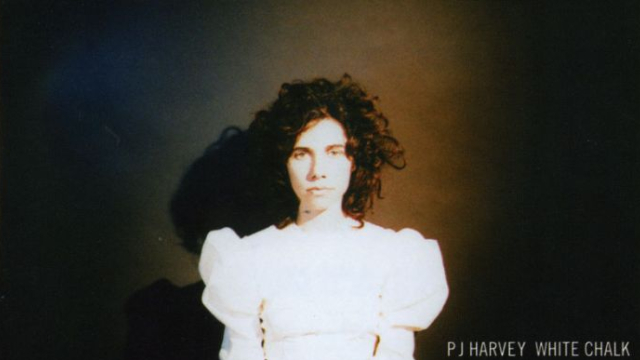White Chalk was probably the biggest surprise of the PJ Harvey catalogue for me. Grungier offerings like Rid of Me and Dry were based on an aesthetic that I guessed I was going to like, and more overtly difficult works like Is This Desire? were difficult in an abrasive electronica fashion that appeals to my personal tastes. But in the crowded genre of piano music it is very difficult to make an impression, and White Chalk did so. Both beautiful and haunting, simple and complex, unlike PJ Harvey but in that very PJ Harvey way, this piano led record combines both classical Chamber Music throwbacks of harps and the zither, and Modern occasional flairs of synth. And together they those things produce a record that sounds like its songs were dragged from the beginning of the previous century, and covered for this one.
Much of this quality might have to do with the return of producer Flood and John Parish for the course of this album’s surprisingly long five month production. The production by the trio is somewhere between the sparsity of Bjork’s Medulla (not acapella sparse, though) with minimal and intentionally repetitive piano chords, and the lushness of Joanna Newsom’s Ys (which came out the previous year). On occasions it even has the fresh water feel of music made from Iceland such as the aforementioned sensual woman-child and piano music like Olafur Arnalds, in places like the one-two punch of “To Talk to You” and “The Piano”.
The sparse instrumentations at points really puts more emphasis than ever on the lyrics and Harvey’s voice. But, instead of feeling the need to overkill with the poetry, Harvey decides to strip them down like her instruments, holding long syllables in a higher register than at any other point in her discography (with maybe the exception of Is This Desire?). With a particular emphasis on the album’s poeticism, I hope you won’t mind my sudden detour into the literary. OK? Good. Now, with the contradictory and clashing imagery of a song like “Silence”, (All those places/ Where I recall…I go to these places/ Intending to think/ And think of nothing), it would be easy to make comparisons to Emily Dickinson; the album cover seems to do so itself, with PJ Harvey stood in a dark room with a pure white dress, like the mythologised persona of Dickinson. But there is much here that suggests an English folk influence to the lyrics, as well as the poets that helped inspire its symbolic and enigmatic depictions of nature like the works of Blake and Yeats, like in the final track “Mountain” and one of the stand out tracks on the album, “Grow Grow Grow”. The language of the album’s most known single, “When Under Ether,” even recalls the famous line from T.S Eliot’s “Love Song of J. Alfred Prucock” or Four Quartets.
But despite all this literary influence, this combination of the dreamscape and landscape as well as the mixed emotional of fear, regret, anguish, and isolation all helps makes this quintessentially Harvey. Think the dread and anguish felt in the infanticide refrain of “Down by the Water”, but kept up consistently for almost the whole 34 minutes, and we have the general feel; from the mother imagery of “Grow Grow Grow”, “Before Departure” and the title track, down to the possible abortion undertones of “When Under Ether.” And that 34 minutes is also a positive for an album as intense and singular as this, for it achieves its emotional effect without outstaying its welcome.
This album adds no doubt in my brain that PJ Harvey could make an album of black metal written for the appalachian nose flute and make it a classic. White Chalk and its Gothic mood contains musical moments that can tremble the air of the brightest day, but after its finished PJ Harvey brings you back to Earth with her heavenly choruses and appeals to “you”. And this heavenly quality is one that would bring itself to the rock of her next project…
What do you think though?
PJ Harvey Album Rankings
- Is This Desire?
- To Bring You My Love
- Stories from the City, Stories from the Sea
- White Chalk
- Rid of Me
- Dry
- 4-Track Demos
- Dance Hall at Louse Point
- Uh Huh Her

